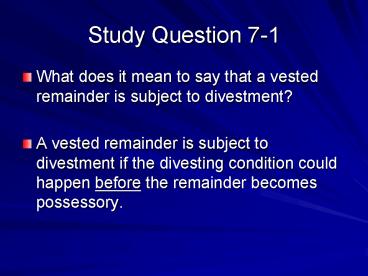Study Question 71 PowerPoint PPT Presentation
1 / 17
Title: Study Question 71
1
Study Question 7-1
- What does it mean to say that a vested remainder
is subject to divestment? - A vested remainder is subject to divestment if
the divesting condition could happen before the
remainder becomes possessory.
2
Study Question 7-2
- What does it mean to say that a remainder is
subject to open? - A remainder is subject to open if it is given
to a class that could expand.
3
Study Question 7-3
- What does it mean to say that a remainder given
to a class is closed? - A remainder given to a class is closed if no
additional members could be added to the class.
4
Study Question 7-4
- Is Bs remainder (1) contingent, (2) vested
subject to divestment, or (3) vested and not
subject to divestment (before becoming
possessory)? - O to A for life, then to B, but if B ever owns
an insurance agency, then to O. - Vested subject to divestment
5
Study Question 7-5
- Is Bs remainder (1) contingent, (2) vested
subject to divestment, or (3) vested and not
subject to divestment (before becoming
possessory)? - O to A for ten years, then to B for life if B
has never owned a tavern, then to C. (B has not
yet owned a tavern.) - contingent
6
Study Question 7-6
- Is Bs remainder (1) contingent, (2) vested
subject to divestment, or (3) vested and not
subject to divestment (before becoming
possessory)? - O to A for 2 years, then to B, but if B ever
uses the land for an insurance agency, then to
C. - Vested not subject to divestment
7
Study Question 7-7
- Is Bs remainder (1) contingent, (2) vested
subject to divestment, or (3) vested and not
subject to divestment (before becoming
possessory)? - O to A for life, then to B, but if the City ever
annexes the land, then to C. - Vested subject to divestment (assuming the
condition is meant to limit As life estate too)
8
Study Question 7-8
- Is the underlined remainder subject to open or
closed ? - O to A for life, then to As children. (A has
one child, B.) - Subject to open
9
Study Question 7-9
- Is the underlined remainder subject to open or
closed ? - A conveyance in a decedents will T (testator)
to A for life, then to Ts children. (T has one
child, B.) - Closed
10
Study Question 7-10
- Is the underlined remainder subject to open or
closed ? - O to A for ten years, then to the 2001 graduates
of State University Law School. (The conveyance
was made in 2002.) - closed
11
Study Question 7-11
- Is the underlined remainder subject to open or
closed ? - O to A for life, then to Bs children. (B
presently has three children.) - Subject to open
12
Study Question 7-12
- What is the state of the title?
- O to A for life, then to B for life, then to C
her heirs however, if C ever uses the land for a
rental, then to O. - A possessory estate in life estate
- B vested remainder in life estate
- C vested remainder in fee simple subject to a
condition subsequent - O right of entry in fee simple absolute
13
Study Question 7-13
- What is the state of the title?
- O to A for ten years, then to B her heirs, but
if B divorces, then to C after As estate has
ended and until C ceases to live on the property,
then to D. - A possessory estate in a term of years
- B vested remainder (subject to divestment) in
fee simple subject to executory limitation - C executory interest in fee simple determinable
- D executory interest in fee simple absolute
14
Study Question 7-14
- What is the state of the title?
- O to A for life, then to B her heirs while B
is using the property for a law office, then to
C however, if C does not marry by age 35, then
Cs estate ends. - A possessory estate in life estate
- B vested remainder in fee simple determinable
- C executory interest in fee simple subject to a
condition subsequent - O right of entry in fee simple absolute
15
Study Question 7-15
- What is the state of the title?
- O to A for life, then to B if B survives A, but
if B does not survive A, then to C if C has
survived A, but if neither B nor C have survived
A, then to D. - A possessory estate in life estate
- B contingent remainder in fee simple absolute
- C (alternative) contingent remainder in fee
simple absolute - D (alternative) contingent remainder in fee
simple absolute
16
Study Question 7-16
- What is the state of the title?
- O to A for life, then to B for ten years, then
to Cs children, but if none of Cs children are
then living, to D. (C is alive has one child,
X.) - A possessory estate in life estate
- B vested remainder in a term of years
- X vested remainder (subject to divestment) in
fee simple subject to executory limitation
subject to open - D executory interest in fee simple absolute
17
Study Question 7-17
- What is the state of the title?
- O to A for life, then to B if B has married, but
if B has never married, then to C for two years,
then to D her heirs. (At the time of the
conveyance, B is married.) - A possessory estate in life estate
- B vested remainder in fee simple absolute
- Cs interest has failed
- Ds interest has failed

